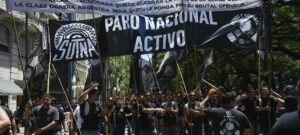 Argentina’s newly elected President Javier Milei, known for his radical right-libertarian policies, is facing his first major challenge as trade unions across the country have called for a general strike.
Argentina’s newly elected President Javier Milei, known for his radical right-libertarian policies, is facing his first major challenge as trade unions across the country have called for a general strike.
First Showdown for Milei
Argentina’s President Milei has begun his term with radical reforms, and many more are expected to follow. Now, resistance is forming: trade unions have called for a general strike.
It’s hot and loud – Karina Nicoletta’s life plays out underground. For 29 years now. She has been working for the “Subte,” the Buenos Aires subway system, for that long. First as a ticket seller, now as a train driver and union leader. She fights for better working conditions for women, for salary adjustments, and better job security.
But never before has so much been at stake as now, under the government of Argentina’s new president, Javier Milei, believes the 50-year-old Argentine. That’s why the subway is at a standstill today.
“I am striking to defend our democracy, a life in dignity, and the rights we as workers have fought for. My salary used to be enough to live on.” But with the current inflation, it is hardly worth anything anymore, says Nicoletta. The current policies primarily affect workers but also the middle class and must be stopped.
First Showdown for Milei
Argentina’s powerful trade unions have called for a general strike. It is the first test for the right-libertarian president, who took office just six weeks ago with the declared goal of curing the country’s chronic crisis through “shock therapy.”
Argentina’s budget deficit is chronic, the debt burden is gigantic, and inflation alone stood at 25 percent in December. “No hay plata” – there is no money – declared Milei on the day he took office. He immediately started with a radical austerity program. Ministries were eliminated, civil servants were dismissed, subsidies were cut, and the currency was devalued massively.
Labor rights are to be flexibilized, state-owned companies privatized. The state, which he sees as overreaching, should be reduced to a minimum, if necessary, even bypassing parliament through decrees, where he does not possess a majority.
Right-libertarian worldview
Milei sees the root of all evil in an alleged socialism that has not only brought Argentina down but also threatens the idea of freedom in the rest of the Western world, just like feminism and the environmental movement, Milei lectured to a somewhat surprised audience at the World Economic Forum in Davos during his first trip abroad.
“The most important leaders of the Western world have abandoned the model of freedom for different versions of what we call collectivism,” Milei said in Davos. He claimed that there were no substantial differences between communism, social democracy, or National Socialism. The speech, which was celebrated on the internet, caused eyebrows to be raised in Argentina – except among the ideological core audience.
Milei wants to push through a massive reform package
It also comes at a time when Milei is trying to gain the support of Congress for his so-called Omnibus Law: a 300-law, over 600-page reform package that includes declaring a state of public emergency.
This would give the government extensive legislative special powers. However, there is resistance. Courts have objected to parts of the decree, and Milei’s team had to revise parts of the Omnibus Law as well.
The clock is ticking. Milei knows that he doesn’t have much time, says political scientist Juan Negri from Torcuato di Tella University in Buenos Aires: He still has relatively strong support among the population, even though the economic situation has deteriorated for now. Milei is taking advantage of this. In the best-case scenario, things will improve after a difficult initial period

